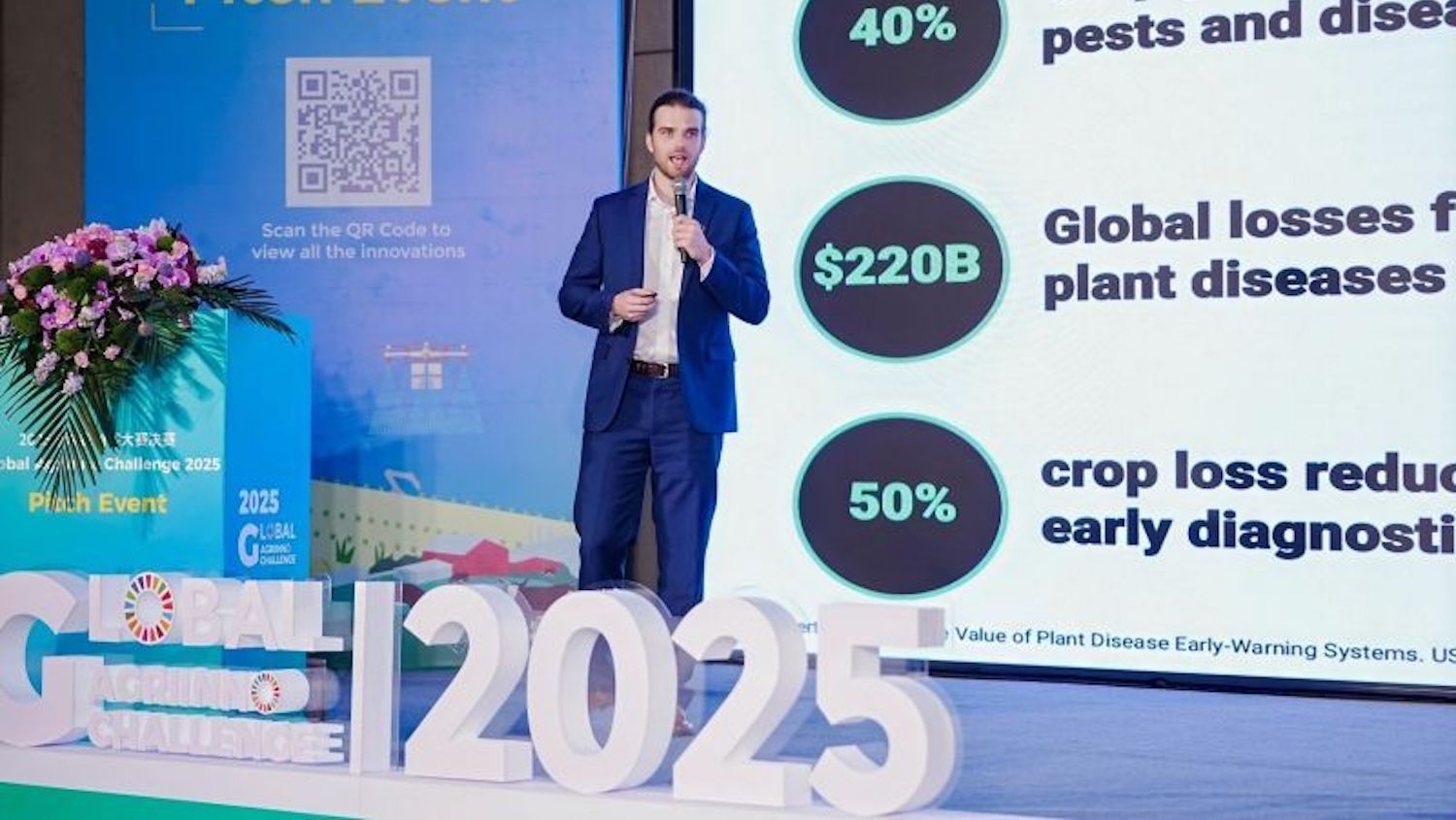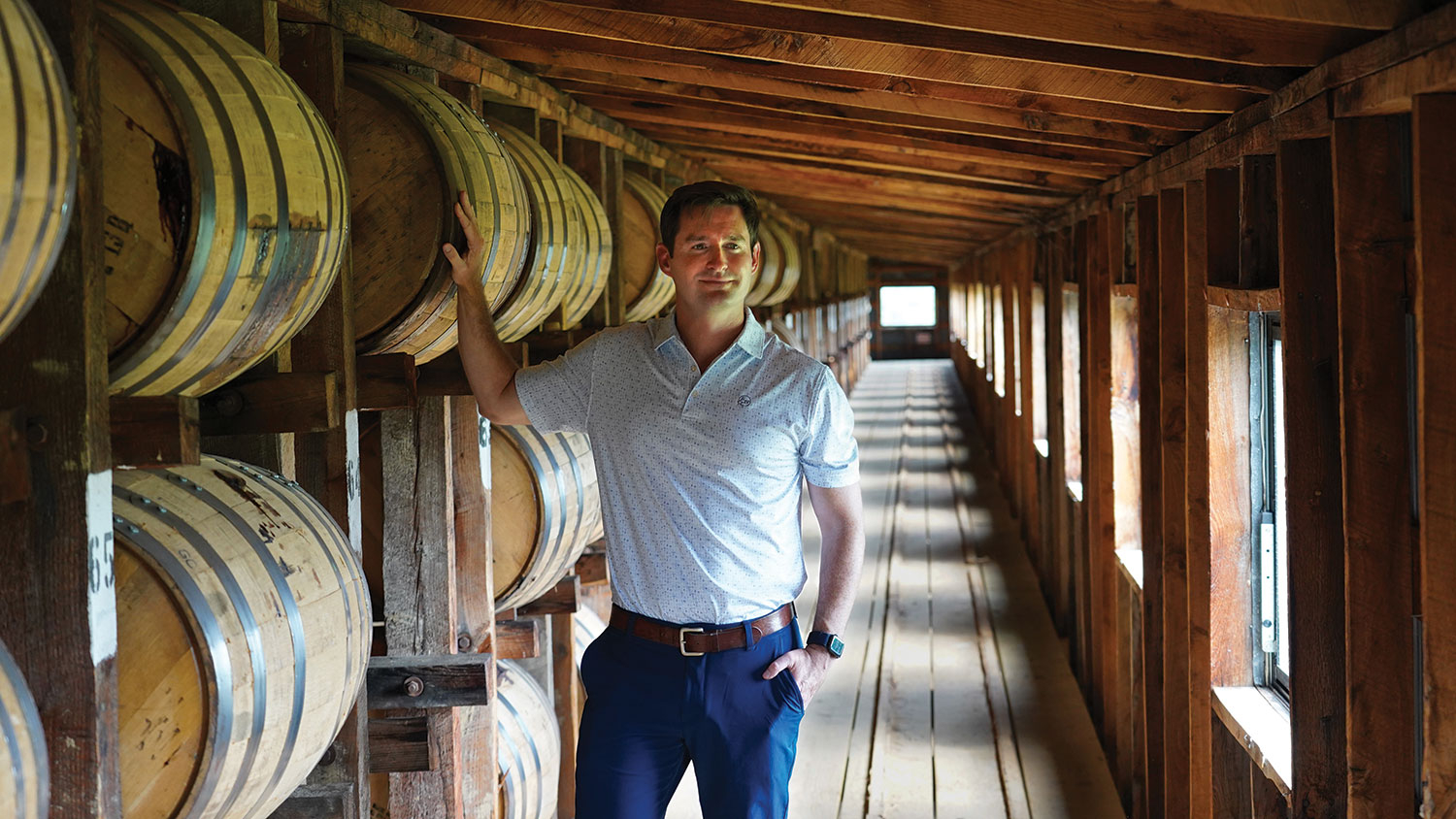Seed2Grow Spotlight: Verdia Diagnostics’ Zach Hetzler
A recent NC State Ph.D. graduate, Hetzler leads Verdia Diagnostics, a university startup out to improve the way farmers detect and diagnose plant diseases.

With a recent third-place win at an agricultural innovation competition with over 500 entries from 97 countries, Verdia Diagnostics and its chief executive officer Zach Hetzler are making their mark internationally. The North Carolina State University startup company develops cost-effective sensor technology that will allow farmers to detect plant diseases early, before plants show physical signs of stress.
The company’s technology is rooted in the Plant Aid project, one of the earliest research projects launched under the N.C. Plant Sciences Initiative’s umbrella. Through Verdia, Hetzler wants to make a dent in the 40% loss of global food crops to pests and pathogens.
Hetzler earned his doctoral degree in chemical and biomolecular engineering in December, then took a postdoctoral research position with his former advisor, Qingshan Wei, who is pioneering field-deployable molecular imaging, sensing and diagnostic tools for people and plants.
In February, Hetzler joined Wei, an associate professor and Alcoa scholar in the Department of Chemical and Biomolecular Engineering, and Yong Zhu, associate head of NC State’s Department of Mechanical and Aerospace Engineering, in creating Verdia Diagnostics. Their goal: to bring their discoveries out of the lab and into farmers’ fields.
Verdia is developing tiny, flexible sensors that attach to plant leaves and deliver continuous information about the plant’s health.
After Hetzler’s strong performance in the United Nations Food and Agriculture Organization’s Global AgriInno Challenge in China in late August, he heads to Rome this month to present Verdia’s technology at the FAO’s annual Science and Innovation Forum, taking place Oct. 13-17.
Hetzler sat down recently to share more about his journey to entrepreneurship, the power of Verdia’s technology and how the North Carolina Plant Science Initiative’s Seed2Grow entrepreneurship program is helping the company achieve its goals.
What led you to become an ag tech entrepreneur?
After earning a bachelor’s degree in human biology at NC State in 2013, I went to work in industry for a few years and came back to NC State as a graduate student in 2019. I joined Qingshan Wei’s lab. He brings lab-grade tests to wherever they are needed by a patient, and that patient might be a human or it might be a plant or, more broadly, it could even be the environment.
I worked on creating sensing chemistries and developing devices and systems that execute and automate the detection of several human and plant diseases.
“I’m approaching the process of building our product as building with the growers, not for them.”
During my Ph.D., I noticed I had a drive for and an interest in entrepreneurship within academia. I saw that a lot of potentially revolutionary discoveries or technologies end up as papers, and then the researchers move on, without translating those discoveries into real solutions that work for the end user. There’s a gap, and a lot of promising technologies can get lost.
When I was graduating, our plant diagnostic technology was reaching maturity. It felt like the right moment to translate our technology from the lab to the field.
Although my background wasn’t originally in agriculture, I’ve come to view that as an advantage. I entered customer discovery with a completely open mind, allowing growers to tell me what the solutions are they need. I’m approaching the process of building our product as building with the growers, not for them.
My goal is to make distinct, real-world impacts with Verdia’s technology. It would be incredible to see our sensors make it into the hands of growers and to see that they’re getting value, at scale, from our solution.
Describe Verdia Diagnostics’ technology.
We are developing sensors for very early disease detection in plants, trying to bring sensing down to the single plant level, essentially turning each plant into a dynamic data generator.
Our sensor detects volatile organic compounds, or VOCs, that are emitted by the plant in real-time. It uses an array of VOC-reactive chemistries that can detect these compounds and then process them through a machine learning algorithm that classifies risky VOC emissions. You can think of it as AI-enhanced smelling of stress for plants.
“Basically, it tells us, ‘This is a diseased plant or a healthy plant,’ and it can make this classification for infected plants about a week earlier than visual symptoms would emerge.”
Basically, it tells us, ‘This is a diseased plant or a healthy plant,’ and it can make this classification for infected plants about a week earlier than visual symptoms would emerge. This is a big step forward from relying upon visual cues or even emerging imaging approaches that only provide a limited lead time.
While a lot of innovative startups are addressing early disease detection in plants, we think we have a real advantage with our approach to monitoring VOCs at the plant-level.
The technology gives growers insight into what their plants are feeling day-to-day, not just a snapshot at a particular time point. We are focusing now on translating this data into real-time insights for growers. We are developing a prototype software dashboard with integrated analysis algorithms to condense this rich source of data into simple, actionable insights that will dramatically reduce yield losses from pathogens.
What stage are you at with the technology, and what challenges do you face?
The technology we’ve licensed from NC State has been demonstrated in a couple of scientific papers at scale for disease detection on tomato plants. We are entering greenhouse pilot validation studies to demonstrate the value of our sensor at scale, and we’re planning to begin pilots in two of our commercial partner sites early next year.
Our beachhead market is controlled environment agriculture. This is mostly greenhouse production, but also includes vertical farming. We’re focusing in this area because the pain-point of diseases is much stronger than it is in outdoor farming, and rapid pathogen containment is really important. Once we’ve validated a product market fit and achieved more scalability, we plan to expand into outdoor applications.
One of the biggest barriers with first-to-market technologies isn’t just technical validation, it’s also proving economic value. Growers operate on tight margins, and they need to see clear return on investment. Our priority now is demonstrating our technology at scale and proving clear economic benefits.
What has N.C. PSI’s Seed2Grow program meant to you and your company?
We were just incorporated in February 2025, and as first-time company founders, we recognized that technical expertise alone will not be enough to succeed. Commercialization, especially in ag tech, is challenging. Experience and connections are very important, and access to the Seed2Grow program provides both of those.
We joined Seed2Grow in March, pretty much as soon as we could get the paperwork done, and we’ve been meeting with its advisers regularly. They’ve helped us push past initial roadblocks that we’ve encountered, helped us with our strategy and been an excellent resource for topics ranging from pitch prep to understanding the complex value chains across agriculture.
—
About the N.C. PSI
With over 100 faculty affiliates from nine North Carolina State University colleges, the N.C. PSI brings together the brightest minds from academia, government and industry to solve complex agricultural challenges through interdisciplinary scientific discovery and innovation, extension and outreach, and education and workforce development. It is part of NC State’s College of Agriculture and Life Sciences, with ties to the Office of University Interdisciplinary Programs.
This post was originally published in Plant Sciences Initiative.
- Categories:


